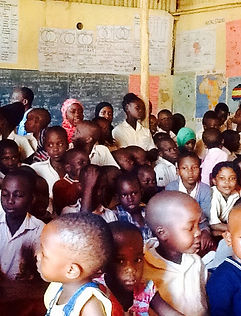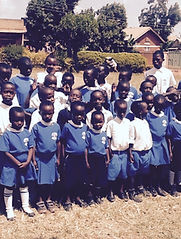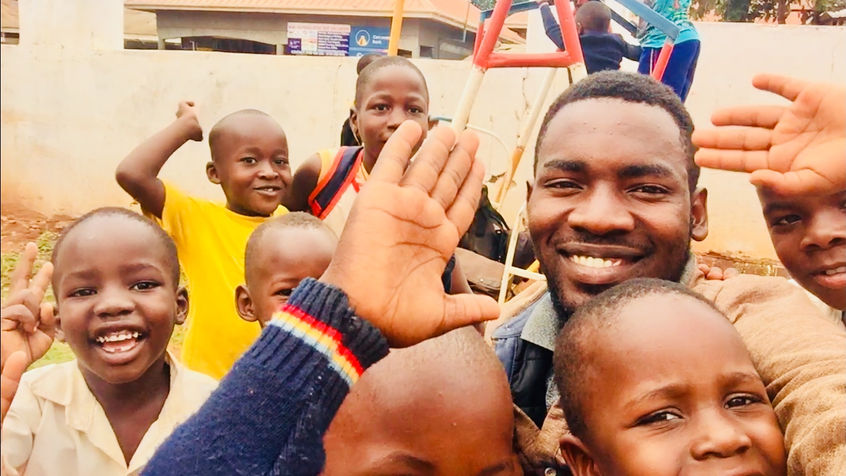
MENTOR ORPHANS AFRICA
(MOA)
-
Covid 19 has found us in a situation where we need to promote cleanliness through washing of our hands, wearing of face masks, sanitizers and social distance which are still limited.
-
The organization has managed to provide clean water for hand wash although the resources are still limited.





WITH LOVE TO MAKE A CHANGE, WE CAN DO ANYTHING TO PROVIDE A LIFE TO THESE STRIVING CHILDREN.
-
About 30 million Ugandans still do not have latrines, and practice open defecation i.e. the use of ponds, rivers, bushes and farms as a defecating site is widely observed. Household access to off-site sanitation system is only 1.65% (only urban cities have off-site waste water system). Diseases caused by poor sanitation are highly increasing in our community

With the population of Uganda estimated at 35.4 million persons and population growth rate of 3.2 percent per annul with over 70% youth; the country is immensely affected by over dependence, which stifles development (UBOS, 2007). As a result the well being of such a population is affected through problems of poverty, low resource base that puts significant pressure on the delivery of basic social services, particularly to children; demand for food, healthcare and education services is growing while access to education and healthcare services at the community level remains limited more so in the rural areas where this project seeks to be initiated. Primary school retention remains a challenge for the Government due to high dropout rates. Consequently, the transition rate from primary to secondary and tertiary levels has been low and very few children are now likely to complete primary and continue to higher levels of education.
BACKGROUND
The 1995 constitution of Republic of Uganda defines a child as someone below the age of 18 years. The National Orphans and Vulnerable Children Policy (NOP-2004) defines an orphan as someone below age of 18 years who has lost one or both parents. The National Strategic Programme Plan of Interventions for Orphaned and Other Vulnerable Children (NSPPI) defines a vulnerable child as one who is suffering and/or is likely to suffer any form of abuse or deprivation and is therefore in need of care and protection. According to the Social Development Sector Strategic Investment Plan (SDIP) vulnerability relates to lack of security, susceptibility to risk and/or exploitation. Vulnerability refers to the risk of falling into poverty and perpetually living in a condition of impoverishment (NDP).
As in most African societies, Uganda’s extended families have assumed the major responsibility for the care of orphans and vulnerable children. The Ugandan government has played a minimal role in the care of orphans and vulnerable children. This leaves the burden to families, households, and communities; yet they also lack enough capacity. Whether households caring for orphans and vulnerable children will be able to meet their basic needs depends largely on the family income. The pressure of caring for increasing numbers of children can challenge families when considering whether they have the capacity to absorb and care for more children.
The United Nations Children's Fund (2003) stresses extended families may not have the capacity to meet the increasing demands of caring for additional children. The report also suggested that the greater the number of orphans in a household, the more likely that household will become poorer.
Families may be unable to meet a child’s most basic needs such as food, shelter, clothing, education, and medical care yet denying children access to food, healthcare and quality education increases their vulnerability to abuse, exploitation and disease.
As HIV/AIDS impoverishes more families and produces new generations of orphans, its impact on children’s rights to education is only likely to intensify. Investing in children’s education and health is important to avoid the greater long-term costs of losing and not educating children and leaving them vulnerable. The benefits of educating and providing healthcare to orphan and vulnerable children are enormous.
The complexity of the problem of child poverty in Uganda is large and growing, and cannot be ignored when designing national development and poverty reduction strategies. Unfortunately, children especially orphans continue to be marginalized irrespective of interventions where by assumptions are made that interventions that address adult and household needs are also good for all children, including boys and girls of school-going and non-school-going ages. This partly explains why child poverty is under-represented in most studies on poverty in Uganda (Save the Children UK, 2003)
ABOUT US
The idea of mentor orphans Africa came about in 2014, Charles Ssenyonga having the founder who lived an orphaned life, after the death of his dear dad, life was a struggle, later he was helped by an old lady named Joan, who helped him through his education, having experienced the lifestyle of being an orphan, he cogitated of bringing out a difference in his community as he grew up seeing many children on streets, some being damped on rubbish puts, this moved him into action, as Joan , mentor for Charles Ssenyonga the founder of this project died, Charles Ssenyonga didn't have a chance to pay her back for the tremendous support, love care, shelter education she provided to him,
thus Charles thought of paying her back by starting up mentor orphans Africa, , this became possible with charity outreach programs that where first set up in the community of Wakiso, Lwamata, kiboga,
singing gospel songs with the committed brothers Uganda Capella group , doing gospel music for the benefit of homeless children and all children faced with trauma ,in 2016, mentor orphans Africa was registered officially by the Ugandan government to start its charity work
OUR DIFFERENCE
We take a personalized, child centered, community led approach to development. We are transparent, cherishing integrity and honesty, seeking long-term impact. We are a catalyst for transformation through child development not charity. We seek to create long-term impact through increasing access to quality education and development for children.
For more information about Mentor Orphans Africa, please view more on our web-site about our programs OR
come to our offices in Nansana Zone East 1 A Kabumbi street-Wakiso Uganda
P.O.BOX 26846 KAMPALA UGANDA

PAVEWAY FOR THE YOUNG
GENERATION
ORGANIZATIONAL STRATEGIC INFORMATION
MISSION
To provide a path way of Hope by giving to the Hopeless, building relationships and reaching out to others by the love of Jesus Christ.

VISION
To reach out to every hurting soul and transform lives
.jpeg)
WORK APPROACH
Children are at the heart of everything we do. We work with children, their families, community organizations, faith based institutions and local governments to transform the lives of the children themselves and the communities that surround them.
.jpeg)






